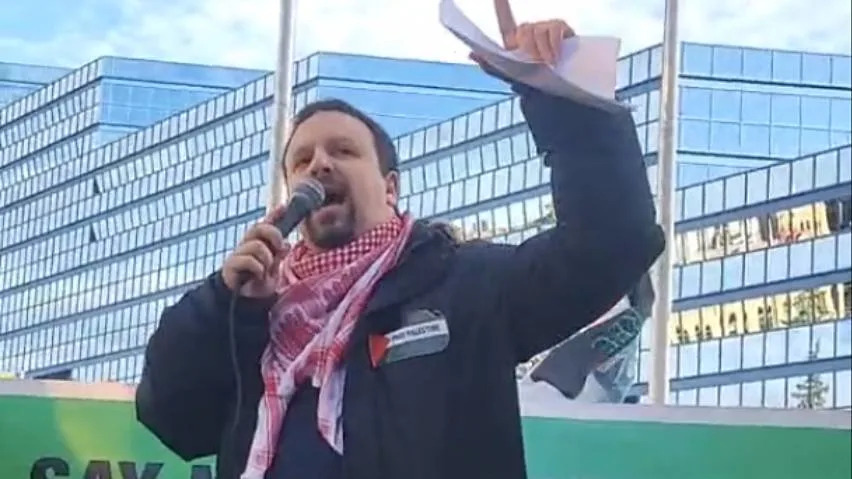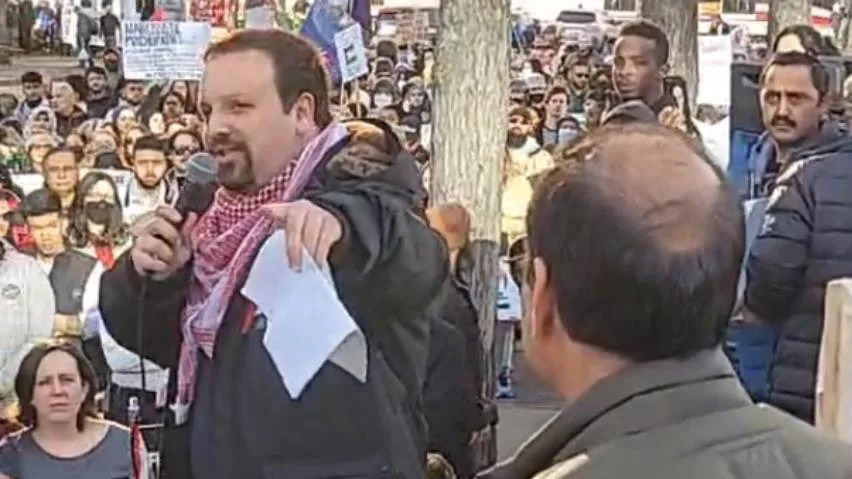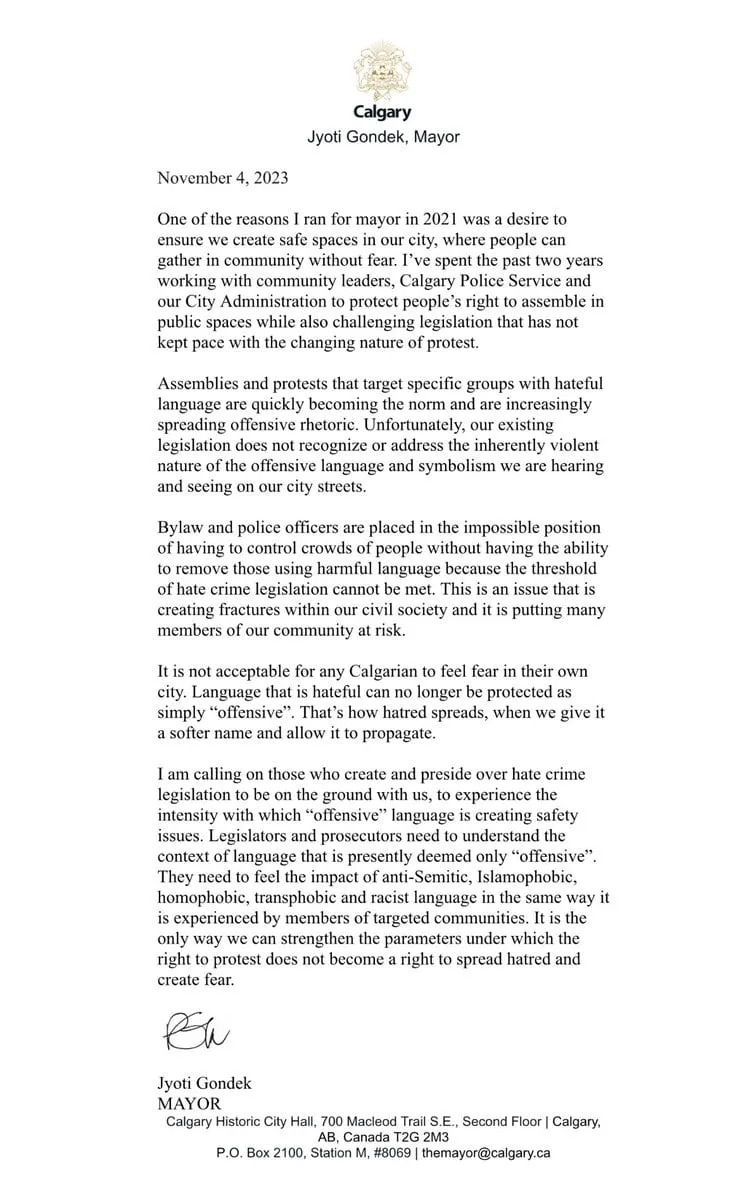CBC
Fri, November 10, 2023

Wesam Cooley, who goes by the name Wesam Khaled, addresses the crowd at a Justice for Palestinians protest in downtown Calgary on Sunday, Nov. 5. He was charged shortly afterward for causing a disturbance with 'hate motivation' applied to the charge. (Saima Jamal/Facebook - image credit)
A Calgary man who police accuse of using an antisemitic phrase during a downtown rally last weekend is facing a charge of causing a disturbance, with hate motivation also being applied to that charge.
Wesam Cooley, 32, who also goes by the name Wesam Khaled, was arrested after the rally on Sunday. The hate motivation aspect of the charge — if proven — would apply as an aggravating factor at sentencing if he is found guilty.
But a co-organizer of the protest, who says she took part in a pre-rally conversation with police, said Cooley was assured by one CPS member before his speech that the words he was about to use while addressing supporters would not result in charges that day.
According to a police statement, two groups of protesters gathered Sunday at Calgary's city hall to rally about the conflict in the Middle East. One group was there to show support for the Palestinian people. The other for Israel.
In the statement, police say members of their Diversity Response Team and Public Safety Unit met with members of both groups before the protests "to ensure the safety of the participants, the public and our police officers and to discuss some of the language and signage observed at past protests."
They say after that conversation Cooley took to the stage and acknowledged the conversation with police.
"He then proceeded to repeatedly use an antisemitic phrase while encouraging the crowd to follow along," according to the police release.
Police won't identify phrase
Police will not say what phrase was allegedly used by Cooley, but according to a public statement from the group that organized the protest, Justice for Palestinians, Cooley was charged for uttering the phrase "From the river to the sea, Palestine will be free."
It is "a protest chant that has been a Palestinian call for liberation for decades," according to the Calgary group's statement.
However, Jewish groups have described the phrase as antisemitic, and say it advocates driving Jews out of Israel.
The Calgary Jewish Federation didn't respond to a request for comment, but thanked police for taking swift action after the weekend protest against a person "who was publicly inciting hate," in a statement posted on the organization's Facebook page on Nov. 7.
"This arrest will hopefully set a precedent not only in Calgary but in other cities," it added.
CBC News has viewed video of the event posted to Facebook and Cooley can be seen leading the crowd in the chant after telling them that he was just told that the Alberta government is looking into deeming the chant as hate speech.
"They are investigating whether or not people should be able to be arrested for hate speech crimes just for chanting that chant," he told the crowd.
He goes on to say that he was "assured by the police that there won't be any arrests today for this."
CBC News contacted Cooley to find out more about what was said to him before the protest on Sunday, but he said he wouldn't be able to comment, based on the legal advice he was receiving.
Cooley's lawyer, Zachary Al-Khatib, sent an email to CBC News on Friday. He said his client "will defend himself on the basis that there was nothing hateful about calling for freedom and equality for Palestinians."
"It is unfortunate that a Calgary police officer acted as he did in this situation. I hope that it was a mistake flowing from a misunderstanding and will be corrected soon," Al-Khatib wrote.
"None of us — no matter our stance on this conflict — should want our society to be a place where political speech is criminalized. Ideas and political slogans should be debated and decided in the public square."

Wesam Cooley, who goes by the name Wesam Khaled, addresses the crowd at a Justice for Palestinians protest in downtown Calgary on Sunday, Nov. 5. He was charged shortly afterward for causing a disturbance with 'hate motivation' applied to the charge.
Wesam Cooley told the crowd he was assured by one CPS member before his speech that the words he was about to use would not result in charges. (Saima Jamal/Facebook)
Saba Amro, an organizer with Justice for Palestinians, said she was at the meeting before the protest with Cooley, as well as another organizer from her group, a CPS community liaison officer and another officer from CPS.
Amro says her group was told by police before the protest began that the phrase "From the river to the sea, Palestine will be free" was being looked at by the Crown prosecutor as potential hate speech.
"We asked the question directly, would anyone be charged on that particular day, Sunday, Nov. 5, for saying and chanting the phrase … and the answer we received was no," Amro told CBC News in an interview.
Richard Moon, a professor in the faculty of law at the University of Windsor, researches freedom of expression and says the charge of causing a disturbance with hate motivation applied to it is "surprising."
"It seems like a way of trying to bring about charges in a case like this where it seems unlikely that the requirements of the hate speech law could be satisfied," he said in an interview.
"Because the speech does not, clearly or obviously, count as sufficiently extreme to be regarded as hate speech under the Criminal Code, it appears the police may have used this roundabout way to bring charges against this individual."
When asked if the phrase in question meets the definition of hate speech, Moon said, "Certainly not. Its meaning is far too open-ended."
Phrase doesn't meet threshold
Doug King, a professor of criminal law at Calgary's Mount Royal University, says a phrase in and of itself doesn't meet the threshold for a causing-a-disturbance conviction. He says it must also be proven that what was said caused a risk to public safety or property.
"It really will come down to, in my mind, what did the officer see in the event itself. Just hearing it doesn't give you all the information you would need to say it's a reasonable charge or it isn't a reasonable charge."
King added that a statement that is innocuous on paper could rise to the level of causing a disturbance, "depending on how it is delivered and the effect it has on the people who are hearing it." King agrees with Moon that what he saw viewing videos of the protest doesn't rise to the level of hate speech.
"I think hatred is a hard thing to prove, when you're talking about passion versus hatred."
CBC asked Calgary police to comment on the content of their conversation with protest organizers, and about whether any assurances were given to organizers that they would not be arrested for repeating the phrase mentioned. CBC also asked if CPS had any information about whether the provincial government is working on deeming the phrase hate speech and, if so, if CPS is involved in those conversations.
A CPS spokesperson responded with an emailed statement.
"The circumstances and full context of the behaviour of the individual involved was considered in laying the charge of causing a disturbance and in applying hate motivation to that charge. The behaviour that led to charges was considered in the context of the specific situation, all of which is broader than a single phrase, gesture, sign or symbol in isolation," the statement said.
"While we appreciate the desire for specific details, this matter is now before the courts and no further specific information will be released."
On Thursday, Justice Minister Mickey Amery was asked by CBC News if the provincial government is considering changes to the laws governing hate speech.
"I'm not aware of any at this time," Amery told reporters.

Calgary Mayor Jyoti Gondek sent out a statement on social media the night before the protest calling for stronger hate speech laws.
According to Mount Royal's King, that's not something that's within provincial jurisdiction.
"What constitutes hate speech is a federal government/Criminal Code issue, and the province has no say in that," he said.
Calgary Mayor Jyoti Gondek called for stronger hate speech laws in a statement on social media last Saturday.
"Unfortunately, our existing legislation does not recognize or address the inherently violent nature of the offensive language and symbolism we are hearing and seeing on our city streets," the mayor's statement says.
"Bylaw and police officers are placed in the impossible position of having to control crowds of people without having the ability to remove those using harmful language because the threshold of hate crime legislation cannot be met."
In light of that statement, and the subsequent arrest, Gondek was asked if she had any knowledge that the provincial government was working on expanding the definition of hate speech, and whether she is involved in any discussions around that, or had any knowledge of conversations involving CPS about proposed changes to the hate speech laws.
In an emailed statement to CBC News, the mayor's office said: "The mayor and council do not direct the work of the Calgary Police Service, and they do not make determinations on what constitutes hate speech. As the mayor clearly stated, Calgarians have the right to assemble peacefully and she denounces hatred targeted against communities."
Following his arrest after the protest on Sunday, Cooley was released on an undertaking that he promise to appear in court on a certain date and abide by certain conditions. Amro says Cooley has been barred from attending any further protests. He is scheduled to appear in court again on Dec. 12.
The maximum penalty for a conviction of causing a disturbance is two years less a day and/or a $5,000 fine.
No comments:
Post a Comment